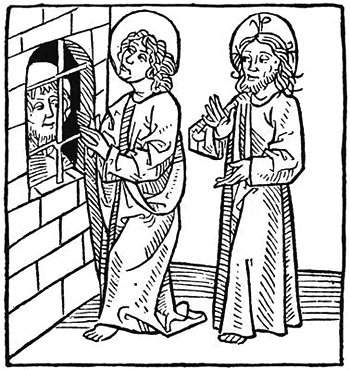
Readings: Is 35:1-6a, 10; Jas 5:7-10; Mt 11:2-11
“Are you the one who is to come,
or should we look for another?”
This is the question that John the Baptist,
imprisoned by King Herod and facing execution,
sends his followers to ask Jesus.
“Are you the one who is to come,
or should we look for another?”
This question is a puzzling one.
Why would John, whom we heard last week
confidently heralding Jesus’ coming,
suddenly seem to doubt that Jesus really is God’s anointed one?
Having proclaimed him the one who is to come,
why would he be sending his followers
to ask if Jesus is really the one who is to come?
Has he forgotten?
Does he think he might have been wrong?
Early Christian theologians were puzzled by this as well,
and tended to think that John
was not really asking a genuine question,
but was posing the question rhetorically,
for the benefit of his followers.
In other words, he knows the answer,
but he wants his followers to hear the words
from Jesus’ own lips
so that they will know, as John knows,
that Jesus is the one who is to come.
I have always found this interpretation of John’s question
somewhat dissatisfying,
probably because I find disingenuous rhetorical questions
somewhat irritating,
as if John were trying to be sly,
by pretending not to know something that he knows perfectly well.
Pope Gregory the Great, in the late-6th century,
took a different approach to this story.
As he interprets it, John is asking a genuine question.
He has no doubt that Jesus is the promised Messiah,
since he had clearly declared this at the beginning of the Gospel,
when he served as Christ’s herald.
But now, at this point in the story,
John is seeking to know something different.
John is facing execution at the hands of Herod;
he knows that he will soon depart this life
for the realm of the dead.
Thus, Gregory says, he is asking
whether he will also be Christ’s herald among the dead,
whether Christ, who had come into our world as God with us,
would also be God with us even in death.
As Gregory puts it, it was as if John were asking,
“Just as you deigned to be born on behalf of human beings . . . ,
will you also die on our behalf” (Homily 5).
I will admit,
Gregory’s interpretation might seem like just as much of a stretch
as the interpretation that says
that John is asking only a rhetorical question.
Yet there is something about it that makes sense to me.
Facing death, John is confronted with a new question:
how deep does your faith in Jesus go?
He believed fervently that Jesus had come into this world
to share our human life.
Now John wants to know,
has he come also to share our human death?
In our Gospel last week John had declared,
“the one who is coming is mightier than I.”
Now John asks, “just how mighty are you?
Are you mighty enough to conquer even death?
I am about to go into the darkness.
Will you be there?
Are you mighty enough to follow me into that dark place
and bring me back to the kingdom of life?”
Will you be there to say to me,
“Be strong, fear not!
Here is your God, he comes with vindication;
with divine recompense he comes to save you.”
John is asking for the gift of faith, to believe that,
even into the mystery of death,
Jesus is the one who is to come.
He will come with his light to dispel death’s darkness.
And as with John, so too with us:
we too ask of Jesus,
“Are you the one who is to come, or should we look for another?”
Are you the one who will come to me
in the darkest places of my life?
Will you be there when I am in pain,
when I am alone,
when I am terrified,
when I am confused,
when I am in the valley of the shadow of death?
Are you the one?
Are you mighty enough to share my weakness?
You who deigned to be born on behalf of human beings,
will you also die on our behalf?
Joining me in death, will you lead me back to life?
We pray in this Advent that God would find us ready,
expectant,
waiting to receive Jesus.
But perhaps even more we should pray
for a deeper faith that it is Jesus who is ready,
expectant,
waiting to receive us.
Let us pray this Advent
that God would find us ready to believe
that no place is so dark that God in Christ is not there,
ready to meet us with joy and gladness,
ready to set sorrow and mourning to flight.